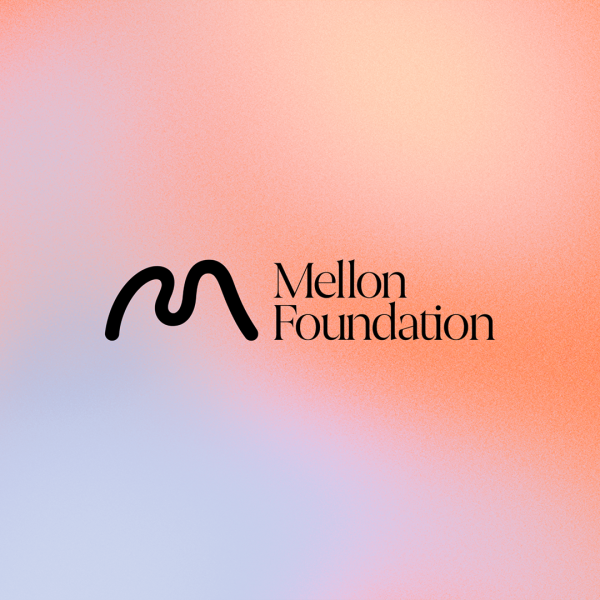Mellon Foundation
National Humanities Medal
2023


With an endowment of $7.9 billion, the Mellon Foundation represents the largest private source of arts, culture, and humanities funding in the United States. Named after the financier, industrialist, art collector, and philanthropist Andrew W. Mellon (1855–1937), the foundation dates back to 1969, when Andrew’s children, Ailsa Mellon Bruce and Paul Mellon, merged two philanthropic entities they had founded separately. Since then, it has awarded some 19,000 grants, handing out about $572 million in 2022 alone. Recipients of Mellon’s largesse have included grantees big and small, from marquee-name universities, libraries, museums, and archives to local arts alliances, theater and dance groups, and others committed to keeping the arts and humanities alive and accessible.
The Mellon Foundation began investing in the arts and humanities at the end of a turbulent decade in American history. Now it’s being honored with a National Humanities Medal for its work during another tumultuous era for the country.
Mellon has often wielded its considerable influence more behind the scenes than in public. In June 2020, a month after the murder of a Black man, George Floyd, by white police officers in Minneapolis set off nationwide protests, the foundation announced a “major strategic evolution” that put social justice front and center, under the auspices of its president, Elizabeth Alexander.
“Since its inception Mellon has worked to strengthen, promote, and defend the humanities as essential to democratic societies, and under my leadership, the foundation has sharpened its commitment to social justice across its grantmaking in the humanities, libraries, archives, and more,” she said in an email to Humanities. “Every grant made has as its motivation a more just, more beautiful, more equitable world at its center.” An acclaimed poet and memoirist (twice a finalist for the Pulitzer Prize), distinguished literary scholar, and longtime arts advocate, Alexander taught at Columbia University, the University of Chicago, Smith College, and Yale University before coming to Mellon in 2018.
She points to several new projects as examples of how the grantmaking Mellon intersects with social justice. Mellon has long been a mainstay in the world of higher education, backing a multitude of projects related to teaching, research, and publishing. This year, its Affirming Multivocal Humanities initiative gave more than $18 million to support programs on race, ethnicity, gender, and sexuality at 95 public institutions of higher learning—a vote of confidence in expansive and inclusive humanistic exploration at a time when “the disciplinary breadth and rigor of the humanities are regularly challenged by book bans and state legislation,” Alexander said.
Beyond academia, Mellon has been making serious investments or interventions in America’s public spaces. A new and still-evolving program area, Humanities in Place, builds on another longstanding area of foundation interest, that is, how to present and preserve American history in museums, archives, and beyond. So far the program has distributed grants totalling more than $40 million to support “a fuller, more complex telling of American histories and lived experiences by deepening the range of how and where our stories are told,” Alexander said.
Another recent signature initiative, the Monuments Project, has helped reshape what the foundation calls “our commemorative landscape”—America’s public monuments and memorials, often hotly contested terrain, as evidenced by the struggle to remove Confederate statues erected in courthouse squares and city parks in the late nineteenth and early twentieth century.
Launched in 2020 with $250 million, and bolstered by another $250 million commitment last year, the Monuments Project focuses not on who should be removed from public spaces but who’s missing from them. Project grantees have created memorials that look nothing like a traditional monument. For example, a Mellon-funded memorial at the Japanese American National Museum in Los Angeles features the Ireichō, a sacred book that holds the names of more than 125,000 people with Japanese heritage who were incarcerated in U.S. government camps during World War II. And a network of organizations from Illinois to Mississippi has received Mellon funding to establish the Emmett Till and Mamie Till-Mobley National Monument.
Asked how the current state of the nation might affect the foundation’s work, Alexander takes the long view: that the arts and humanities bring meaning to individual lives and a sense of imagination and possibility to a society made up of what she describes as “beautifully expansive and varied American cultures.” One sign of Mellon’s commitment to that vision: the foundation has ramped up its grantmaking by more than $200 million annually since 2018—more than $3.1 billion in all, according to its president.
“We live in a time of deep divisions and societal upheaval—a time not unlike when both the NEH and the Mellon Foundation were initially established nearly 60 years ago,” Alexander said. “No matter the outcome of this election or elections to come, and no matter the degree of change that may exist in the culture at a given time, our deep commitment to the work will continue.”
—Jennifer Howard